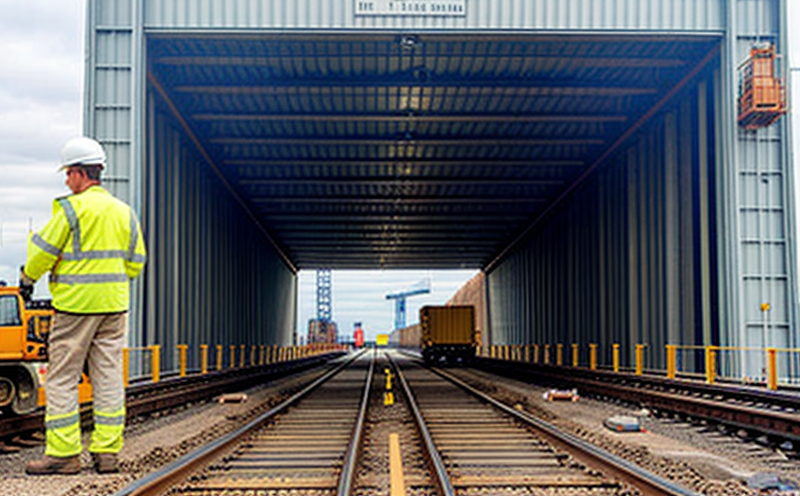Verifying the load capacity of materials used for bridges, tunnels, and other heavy-duty infrastructure
The Crucial Role of Verifying Load Capacity in Ensuring Infrastructure Integrity
As the backbone of modern transportation systems, bridges, tunnels, and other heavy-duty infrastructure play a vital role in connecting communities, facilitating trade, and driving economic growth. However, with increasingly complex designs, larger spans, and heavier loads, these structures require meticulous planning, precise engineering, and rigorous testing to ensure their safety and longevity.
At the forefront of material verification for critical infrastructure is Eurolab, a leading laboratory services provider that specializes in verifying the load capacity of materials used in bridge construction, tunnel engineering, and other heavy-duty applications. This essential service helps businesses minimize risks, optimize designs, and maximize returns on investment by providing comprehensive testing and analysis.
What is Verifying Load Capacity?
Verifying the load capacity of materials involves subjecting them to a series of rigorous tests to determine their ability to withstand various types of loads, including static weight, dynamic impact, and cyclic loading. This process ensures that materials used in bridge construction, tunnel engineering, and other heavy-duty applications can bear the anticipated loads without compromising safety or structural integrity.
Advantages of Verifying Load Capacity
The benefits of verifying load capacity are numerous and far-reaching
Improved Safety By assessing material strength and durability under various loading conditions, businesses can minimize the risk of catastrophic failures, ensuring a safer working environment for construction personnel and minimizing the potential for accidents.
Optimized Designs Eurolabs testing services enable engineers to refine bridge designs, reducing costs associated with over-engineering or rework due to inadequate material selection.
Enhanced Durability By verifying load capacity, businesses can extend the lifespan of infrastructure assets, reducing maintenance and repair needs, and minimizing the environmental impact of construction activities.
Compliance with Regulations Verifying load capacity ensures compliance with international standards and regulations, such as those set by the American Association of State Highway and Transportation Officials (AASHTO) or the International Organization for Standardization (ISO).
Reduced Liability By demonstrating that materials have been thoroughly tested and meet minimum safety standards, businesses can mitigate liability risks associated with infrastructure failure.
Cost Savings Eurolabs expert testing services can help businesses avoid costly rework or redesigns due to inadequate material selection or design flaws.
Key Benefits of Eurolabs Load Capacity Verification Services
Eurolabs comprehensive load capacity verification services offer the following benefits
Advanced Testing Capabilities Our state-of-the-art facilities and equipment enable us to simulate a wide range of loading conditions, including static weight, dynamic impact, and cyclic loading.
Expert Analysis and Reporting Our team of experienced engineers provides detailed analysis and reporting, enabling businesses to make informed decisions about material selection and infrastructure design.
Fast Turnaround Times Eurolabs efficient testing protocols ensure that results are delivered quickly, allowing businesses to stay on schedule and meet project deadlines.
Frequently Asked Questions
What types of materials can be tested for load capacity?
Our laboratory specializes in testing a wide range of materials commonly used in bridge construction, tunnel engineering, and other heavy-duty applications, including steel, concrete, fiber-reinforced polymers (FRP), and composites.
How do I prepare my materials for load capacity testing?
Our team will provide detailed instructions on material preparation and submission procedures to ensure seamless testing and analysis.
What are the benefits of verifying load capacity for bridges and tunnels specifically?
Verifying load capacity is critical for ensuring that bridge structures can withstand heavy loads, dynamic impacts, and cyclic loading conditions, while tunnel engineering requires precise calculations to prevent structural collapse or rockfall hazards.
Can I perform my own load capacity testing in-house?
While some businesses may attempt to conduct their own load capacity testing, Eurolabs expert services offer unparalleled accuracy, reliability, and regulatory compliance.
Conclusion
Verifying the load capacity of materials used for bridges, tunnels, and other heavy-duty infrastructure is a critical step in ensuring the safety, durability, and longevity of these structures. By partnering with Eurolab, businesses can minimize risks, optimize designs, and maximize returns on investment through our comprehensive testing and analysis services.
Dont compromise on material selection or infrastructure design trust Eurolabs expert team to provide accurate and reliable load capacity verification results. Contact us today to learn more about how we can support your business needs.




